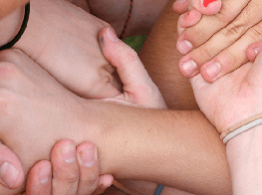Volunteers play a crucial role in providing sport and active recreational experiences for people with disabilities. Without volunteer support, few people with disabilities are able to participate in sport and active recreation or camping experiences.
The volunteer is a person who believes in an organization’s mission and who freely and willingly gives service without compensation.
Organizations place specific trust and responsibility in the volunteer. It is important to be aware of these in understanding personal responsibilities and the expectations that are made of the volunteer.
Organizations often work on the basis of a ‘one-to-one’ supervision of a participant with a disability, for most sport and active recreation activities. This does not imply sole responsibility for just the one person and a lack of responsibility for other participants. The one-to-one role is that of encouraging participation of the person in activities as fully as possible, according to the participant’s ability, being available to the person as required and ensuring that personal and safety needs are met at all times.
In addition to the one-to-one role, volunteers also participate in all program tasks and activities that will ensure safe and quality experiences for all participants and will share with other volunteers and personnel in providing for the welfare of the participants. The role of the volunteer is very diverse, ranging from assisting with the personal needs of a participant to facilitating activities and assisting meal preparation and facility maintenance.
The volunteer has the responsibility of caring for the participants respectfully and responsibly. They have a duty of care to those entrusted to them for the duration of the recreation experience. This means that they must take all reasonable care to avoid actions or omissions that they can reasonably foresee would be likely to injure, or cause harm to someone else.
A volunteer leader’s role may not be at all different from that of a paid staff member and may involve the following duties:
- Being responsible for one nominated participant with a disability
- Knowing where this participant is at all times, whilst on the program
- Being responsible for delegating this responsibility to an appropriate alternative leader, in the event that the volunteer is not available, during time-out or in the case of an emergency
- Having access to the participant’s medical records at all times
- Being responsible for ensuring that they have access to an accident and incident report form, in the event of an accident or incident and must complete it as soon possible
- Being responsible for knowing where the nearest telephone is and local emergency numbers
- Being familiar with the emergency procedures, including fire procedures
- Being responsible for ensuring that all personal needs of the participant have been met, such as medication, meals, toilet and shower and
- Being responsible for being aware of and implementing any restrictions necessary for the participant to avoid injury as a result of a physical disability, food allergy or other personal limitation.

